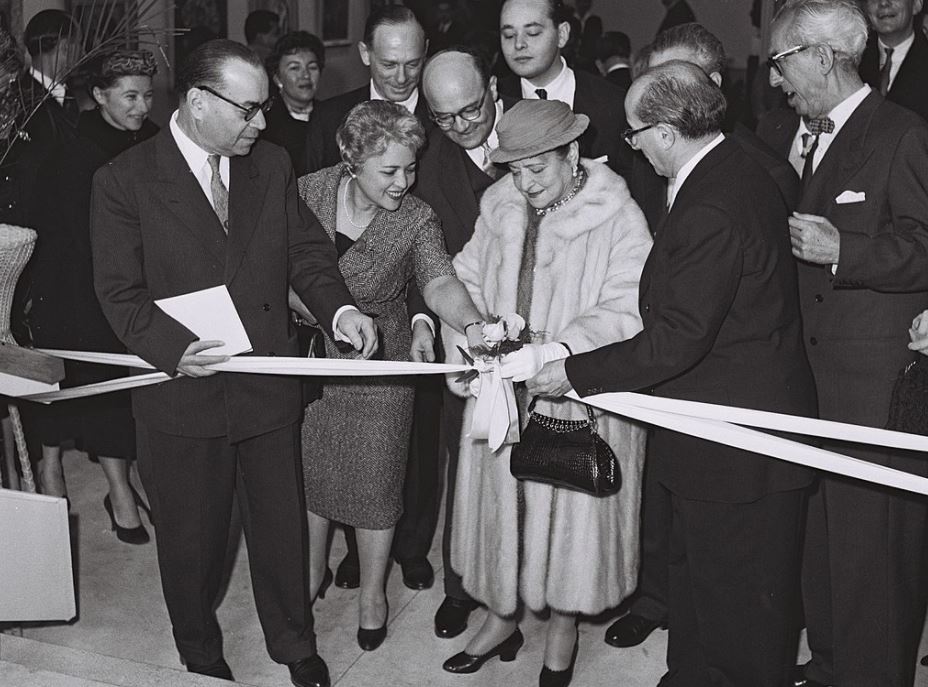First Self-Made Female Millionaire
 Chaya Helena Rubinstein (1872-1965) was born in the Jewish ghetto of Krakow, Poland, the oldest of eight daughters in a very religious family. Her cousin was Martin Buber. At age 16, she was arranged to be married but refused to go along with it, instead running away to Switzerland, and then Australia. Although she spoke no English, the local ladies fell in love with her fashion sense and makeup. After agreeing to sell off most of what was in her luggage, she realized she could start a business. With help from an aunt, Rubinstein found her way to the region of Coleraine, famous for its millions of sheep, which produce lanolin, the key ingredient in her creams. Rubinstein worked as a waitress by day, and experimented with her creams by night. With some help from a wealthy admirer, Rubinstein launched her business. It didn’t take long for her to open up her own shop in the heart of Melbourne. Within five years, she opened two more locations: in Sydney and London, England. At the time, women were barred from getting bank loans, so Rubinstein saved up all the money herself and paid in cash. In 1912, she moved to Paris with her first husband, and there opened a new salon. During World War I, the family fled to New York, and Rubinstein opened up shop there as well. Business boomed, and Rubinstein expanded to another twelve cities. She soon became the most famous businesswoman in the world—and the richest. She has been credited as the world’s first self-made female millionaire. After her first marriage fell apart, Rubinstein tied the knot with a Georgian prince, and took on the title “Helena Princess Gourielli”. Rubinstein was a huge philanthropist, and her charity distributed around $130 million to causes around the world. She had a great life-long rivalry with Elizabeth Arden, of whom she said: “With her packaging and my product, we could have ruled the world.” Rubinstein faced a tremendous amount of adversity, as well as anti-Semitism. (In 1941, she was rejected from living in a Park Avenue apartment because she was Jewish, so she bought the whole building!) Nonetheless, she persevered through it all and became a pioneer in the cosmetics industry, in business, and in marketing, continuing to work into her 90s. Among her innovations were waterproof mascara and what may be the first sunscreen. Today, her company is owned by L’Oréal, which presents the Helena Rubinstein Women in Science Awards yearly in her honour.
Chaya Helena Rubinstein (1872-1965) was born in the Jewish ghetto of Krakow, Poland, the oldest of eight daughters in a very religious family. Her cousin was Martin Buber. At age 16, she was arranged to be married but refused to go along with it, instead running away to Switzerland, and then Australia. Although she spoke no English, the local ladies fell in love with her fashion sense and makeup. After agreeing to sell off most of what was in her luggage, she realized she could start a business. With help from an aunt, Rubinstein found her way to the region of Coleraine, famous for its millions of sheep, which produce lanolin, the key ingredient in her creams. Rubinstein worked as a waitress by day, and experimented with her creams by night. With some help from a wealthy admirer, Rubinstein launched her business. It didn’t take long for her to open up her own shop in the heart of Melbourne. Within five years, she opened two more locations: in Sydney and London, England. At the time, women were barred from getting bank loans, so Rubinstein saved up all the money herself and paid in cash. In 1912, she moved to Paris with her first husband, and there opened a new salon. During World War I, the family fled to New York, and Rubinstein opened up shop there as well. Business boomed, and Rubinstein expanded to another twelve cities. She soon became the most famous businesswoman in the world—and the richest. She has been credited as the world’s first self-made female millionaire. After her first marriage fell apart, Rubinstein tied the knot with a Georgian prince, and took on the title “Helena Princess Gourielli”. Rubinstein was a huge philanthropist, and her charity distributed around $130 million to causes around the world. She had a great life-long rivalry with Elizabeth Arden, of whom she said: “With her packaging and my product, we could have ruled the world.” Rubinstein faced a tremendous amount of adversity, as well as anti-Semitism. (In 1941, she was rejected from living in a Park Avenue apartment because she was Jewish, so she bought the whole building!) Nonetheless, she persevered through it all and became a pioneer in the cosmetics industry, in business, and in marketing, continuing to work into her 90s. Among her innovations were waterproof mascara and what may be the first sunscreen. Today, her company is owned by L’Oréal, which presents the Helena Rubinstein Women in Science Awards yearly in her honour.
Words of the Week
We have been waiting for 2,000 years. Is that hurrying?
– Golda Meir, to King Abdullah of Jordan in a May 10, 1948 meeting, when he asked not to “hurry” to declare independence.

Helena Rubinstein cuts the ribbon at the grand opening of her Museum of Art in Tel-Aviv (1959)

